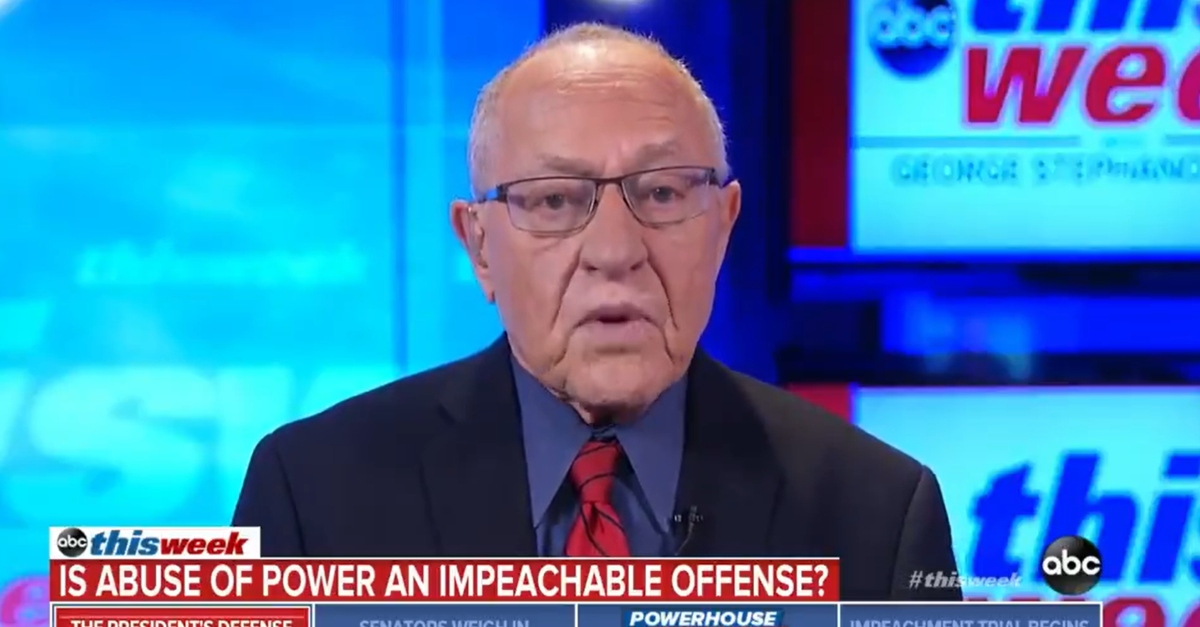
CNN asked a federal judge to dismiss a defamation lawsuit that was filed by Alan Dershowitz in September, calling the litigation “meritless” and even quoting from the Harvard Law professor emeritus’s memoir to suggest that the basis for the legal action runs counter to the foundational principles of First Amendment jurisprudence.
The allegations stem from news coverage of Dershowitz defense of Donald Trump during the president’s impeachment trial in the Senate several months ago.
Dershowitz argued that a sitting president may engage in a quid pro quo arrangement with a foreign leader—provided that the exchange is done with the intent of winning re-election in the public interest and not in violation of some law. While his theory was widely panned by attorneys and legal experts across the media landscape, Dershowitz claimed that CNN’s coverage intentionally omitted portions of his argument to make it appear as though he was arguing “the exact opposite of what he said.”
“Every public official that I know believes that his election is in the public interest, and mostly you’re right–your election is in the public interest—and if a president does something which he believes will help him get elected—in the public interest—that cannot be the kind of quid pro quo that results in impeachment,” Dershowitz argued in January.
On Friday, CNN filed a motion in the U.S. District Court for the Southern District of Florida arguing that Dershowitz’s lawsuit should be dismissed. CNN said its coverage of Dershowitz is privileged under the Fair Report Privilege; the network contended that its commentators were expressing opinions about the perceived basis of his claims.
“Dershowitz’s disagreement with CNN about the meaning of the words he spoke on the Senate floor is just the type of political debate involving matters of profound national importance that is central to the American values of self-governance; it is not grounds for a defamation lawsuit,” the network’s attorneys wrote in the court documents.
CNN further defended its coverage by quoting an excerpt from Dershowitz’s 2013 memoir Taking the Stand: My Life in the Law, in which the author identified himself as an unabashed advocate for freedom of speech.
“As Dershowitz himself once wrote: ‘[f]or me, the freedom to speak, to write, to dissent, to seek a redress of grievances, to assemble, to doubt, to challenge, has always been central not only to democratic governance but to life itself. It is both a means and an end,'” the CNN filing said.
In his lawsuit, Dershowitz claimed that CNN intentionally omitted the clause about an illegal quo in order to “falsely paint Professor Dershowitz as a constitutional scholar and intellectual who had lost his mind.”
In response, CNN argued that it has no duty to present Dershowitz’s argument in the manner of his choosing. The network also emphasized that while its commentators discussions of “core political speech” were protected under the First Amendment, its broadcasts also aired undoctored footage of Dershowitz argument and allowed him to defend himself on the channel the following day.
“This lawsuit is about statements made by Dershowitz on the floor of the Senate while arguing that an impeached President should not be convicted and removed from office. Without question, it involves core political speech,” the motion stated. “Yet in this lawsuit, Dershowitz seeks to recover from CNN for choosing to air a Clip of this argument and comment on it, not because the Clip itself is altered, but because he thinks CNN should have used a slightly longer Clip that he believes makes his arguments look better. But CNN had no such obligation or duty to air a longer clip. CNN accurately aired a portion of Dershowitz’s argument and fairly commented on it. The First Amendment precludes recovery.”
Law&Crime reached out to Dershowitz for comment but had not received a response as of publishing.
Read the full filing below:
CNN MTD Dershowitz by Law&Crime on Scribd
[image via ABC 7 screengrab]